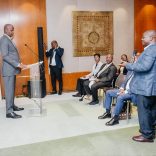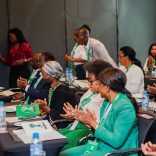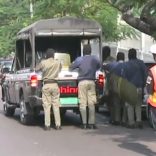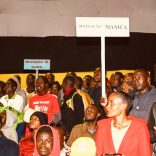Mozambique: Fight against terrorists remains on top of agenda – Chapo
Moves for peace “are work of all Mozambicans”

O País
Mozambican President Filipe Nyusi declared on Monday that the moves to secure effective peace in the country are the work of all Mozambicans.
Speaking at a rally in the Mulima administrative post, in Chemba district, on the first day of a working visit to the central province of Sofala, Nyusi thanked the public for all the encouragement he has received during the negotiations between the government and the rebel movement Renamo.
“I want to say once more that this work belongs to all of us”, he stressed. “The prayers ask for peace, the songs ask for peace, the speeches ask for peace. This means that peace is a joint task for all of us”.
“Those of us who are at the head of the process are simply interpreting the will and courage of the people”, Nyusi added. “With their encouragement, we shall continue until we have achieved what the people want in this country”.
He reaffirmed that he has resumed dialogue with the new leadership of Renamo, following the death on 3 May of Afonso Dhlakama, who had led Renamo since 1979. Two days after Dhlakama’s death, the Renamo Political Commission appointed a former general secretary of the party, Ossufo Momade, who had held the rank of general in the Renamo army, as interim coordinator.
“I don’t like to talk much when things haven’t yet ripened, but I already said, when I received the Ugandan President (Yoweri Museveni), that I have begun talking with the new Renamo leadership to see if, from where we were, we could make progress”, said the President.
He said he was doing all he could to ensure that the talks do not run aground. “We want children smiling and without fear, we want their parents, men and women, going to work without fear. We want to live in peace, developing this Mozambique”, he declared. “This is the essential objective of Mozambicans right now”.
The talks between the government and Renamo, involving frequent phone contacts between Nyusi and Dhlakama, and the occasional visit by Nyusi to Dhlakama’s military base in the central district of Gorongosa, centred on two themes – decentralisation, and the dismantling of Renamo’s illegal militia.
In February, Nyusi announced a consensual position on decentralisation, notably on the indirect election of provincial governors and district administrators. This consensus was worked into constitutional amendments which are now before the Mozambican parliament, the Assembly of the Republic.
Nyusi told the Chemba rally that he had received assurances from the parliamentary group of the ruling Frelimo Party that it would do its best to ensure that the decentralisation package is speedily approved.
But passing constitutional amendments requires a two thirds majority – 167 votes out of the 250 members of the Assembly. Frelimo’s majority is not large enough for this. Even if the 17 deputies from the Mozambique Democratic Movement (MDM) were to vote with the 144 from Frelimo, that would still be six votes short of a two thirds majority.
Hence the only way that anything in the constitution can be changed is by consensus between the Frelimo and Renamo parliamentary groups, and that has proved elusive.
The current sticking point concerns the appointment of district administrators. The consensual document between Nyusi and Dhlakama says that the first elections of district assemblies will only take place in 2024. Whoever is head of the winning slate becomes the administrator.
But the document, and the draft constitutional amendments, are silent about how district administrators will be appointed before 2024. Since the matter is not mentioned in the Nyusi-Dhlakama document, Frelimo assumed that the current situation, whereby the Minister of State Administration appoints the administrators, will continue until 2024.
Renamo, however, insists that the provincial governors, to be elected in 2019, must have the power to appoint and dismiss district administrators. Since Renamo expects to win several governorships, its proposal would ensure that Renamo members are put in charge of dozens of districts.
This dispute means that the constitutional amendments have been deadlocked inside the Assembly’s Commission on Constitutional and Legal Matters. There is no point in bringing them before the Assembly plenary until consensus is reached between the Frelimo and Renamo groups.
That deadlock may have been broken. On Tuesday afternoon, the Assembly’s governing board suddenly announced that the constitutional amendments will be discussed in the Assembly plenary on Wednesday.
Once the Constitution has been amended, the electoral laws must be changed to bring them into line with the constitutional amendments.
This sitting of the Assembly is due to close on Friday – but it is clearly impossible to amend both the Constitution and the electoral law by then. Conceivably, this sitting could be prolonged by a week or more. Alternatively, an extraordinary sitting of the Assembly could be called to deal solely with these matters.
But it would be futile to hold any plenary discussions at all on the Constitution unless a genuine consensus between the Frelimo and Renamo groups can be guaranteed in advance.












Leave a Reply
Be the First to Comment!
You must be logged in to post a comment.
You must be logged in to post a comment.